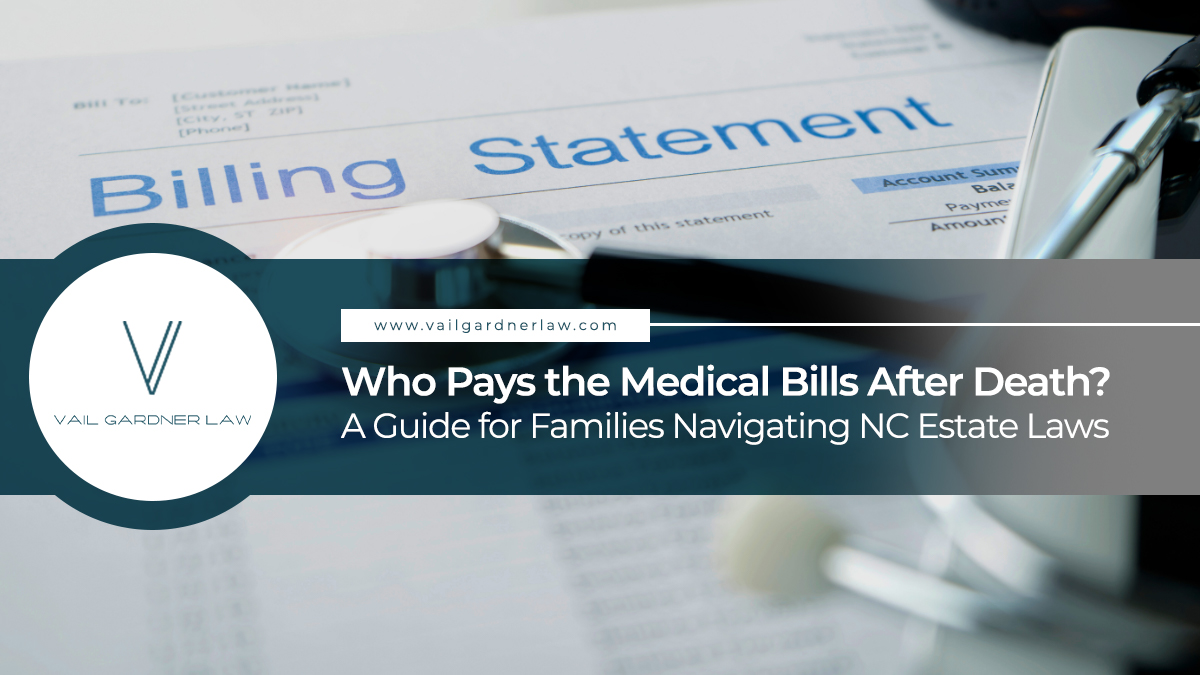When a loved one passes, the last thing you want to think about is unpaid medical bills. Yet, those bills don’t just disappear. If you’re facing this situation, you might wonder who’s responsible for covering these debts. Let’s walk through who pays the medical bills after death in North Carolina.
We’ll explore how estate laws work and how you can protect your family’s assets while managing the final expenses. Understanding the process can make it a bit easier as we navigate these challenges.
Handling Unpaid Medical Bills During Probate in North Carolina
Understanding the Role of Probate
When someone passes away in North Carolina, their estate goes through probate. This legal process ensures that debts, including unpaid medical bills, are addressed before distributing assets to beneficiaries.
It can feel overwhelming, but it’s an essential step that protects both creditors and the family.
Probate acts as a way to settle these financial matters so we can move forward with the distribution of what remains in the estate.

Who is Responsible for Medical Debts?
During probate, the estate of the deceased is responsible for paying off outstanding medical bills. This means that assets such as bank accounts, property, and other valuables will be used to cover these debts.
The executor or administrator of the estate identifies all outstanding medical expenses and ensures they are paid out of the estate before any other distributions are made.
If the estate doesn’t have enough assets to cover the bills, options exist for prioritizing payments.
Prioritizing Debts in North Carolina Probate
In North Carolina, there’s a specific order in which debts are paid during probate.
Medical bills fall into a category known as unsecured debts. These are generally paid after secured debts (like a mortgage) and administrative costs (such as probate fees).
The court ensures that any medical bills are handled appropriately, but it’s essential to know that unsecured debts are often paid only after more pressing obligations are covered.
What Happens If the Estate Can’t Cover the Bills?
Sometimes, an estate doesn’t have enough funds to cover all the debts, including medical expenses.
In these cases, creditors may not receive full payment, and beneficiaries might not receive any inheritance. However, as a family member, you’re not personally responsible for your loved one’s unpaid medical bills. The estate is the only party liable for settling those debts.

Seeking Legal Guidance
Managing medical bills during probate can be stressful, especially if you’re unfamiliar with how the process works. If you feel uncertain about handling the estate, it can be helpful to seek out legal assistance to ensure you’re following North Carolina’s laws correctly.
An estate administration attorney can help you become the estate’s executor or administrator and handle all the paperwork and court-demanded inventories and reviews.
Other Expedited Probate Types and Handling Bills
Small Estate Administration
In North Carolina, if the estate of the deceased person is relatively small, you might be able to take advantage of a quicker probate process known as Small Estate Administration.
This process is typically available when the total value of the deceased person’s estate, including any unpaid medical bills and other debts, is less than $20,000 (or $30,000 if there’s a surviving spouse).
If the estate qualifies, you can settle outstanding debts, including medical debt, without going through a lengthy probate process. This type of probate can be helpful if you’re dealing with medical bills and need to resolve things efficiently, especially if there are no significant assets like a home or retirement accounts to handle.
It allows you to follow North Carolina probate law while quickly paying off necessary expenses such as medical treatment, credit card debt, and other unpaid bills left by the deceased person.

Summary Administration
Another expedited option is Summary Administration, which applies if the deceased person left all their assets to a surviving spouse.
This type of probate skips much of the formal court process, allowing the spouse to pay debts from the estate without the need for lengthy legal proceedings. If the person’s estate is straightforward and the surviving spouse is the only heir, this can be an excellent way to handle outstanding debts like medical bills or nursing home costs.
In this case, the surviving spouse can use the estate’s assets to pay off debts, including medical services, credit card accounts, and auto loans, without needing to go through the full probate process.
However, it’s important to note that North Carolina is not a community property state, so surviving spouses aren’t personally responsible for their late spouse’s medical debt unless they were a joint account holder or signed an agreement with the medical provider.
Struggling with unpaid bills and legal processes after a loved one’s passing? At Vail Gardner Law, we’re here to help. Call (919) 246-6676 today or schedule your free consultation online and get the support you need during this difficult time.
Handling Bills Through Expedited Probate
Both Small Estate Administration and Summary Administration make it easier to settle unpaid bills, including medical debt and nursing home debt, without getting caught up in a long court process.
By using these faster probate options, you can follow state probate laws and ensure that debts like medical services or nursing home bills are handled quickly. However, it’s important to remember that creditors, including medical providers, still have the right to seek repayment from the decedent’s estate.
You’ll want to ensure sufficient assets are available in the estate to pay these debts or negotiate a payment plan if necessary. Keep in mind that debt collectors and credit bureaus might get involved if debts like credit card debt or unpaid medical bills are not paid promptly.
Having proper estate planning in place can help avoid these issues in the future and ensure that loved one’s debts are taken care of after death.
Always discuss your estate administration plans with an attorney who handles probate issues. They can guide you about the order in which to pay bills and also help you negotiate many types of bills, including medical debt!

How Does Estate Administration Work in North Carolina?
The Role of Estate Administration
When a person dies in North Carolina, their estate must go through a legal process known as estate administration. This process involves identifying and valuing the deceased person’s assets, paying off any outstanding debts (such as medical debts and credit card accounts), and distributing the remaining assets to beneficiaries.
If you’re the executor of the estate or a surviving family member, understanding how estate administration works is key to ensuring all the payments, including medical bills, are handled properly. The process can feel complex, but it’s meant to ensure the deceased person’s debts are paid before their assets are distributed.
Handling Debts During Estate Administration
One of the main tasks in estate administration is handling the deceased person’s debts. Medical bills, credit card accounts, and other financial obligations must be addressed using the estate’s assets.
In North Carolina, the estate is responsible for paying these debts, not the surviving family members or the spouse.
Order of Debt Payment When Settling An Estate
Generally, the order in which debts are paid is in the following order:
- Costs and expenses of administration
This includes fees related to the administration of the estate, such as attorney fees, executor fees, and court costs. - Funeral expenses
Reasonable funeral expenses are paid next. The statute generally limits the amount that can be considered “reasonable” for this purpose. - Grave marker and burial expenses
Expenses for purchasing a gravestone or similar items are paid after funeral expenses, but these must also be reasonable. - Federal taxes and debts due to the U.S. government
Any outstanding federal tax liabilities or other debts owed to the federal government receive priority after funeral and administrative expenses. - Medical bills for the last 12 months before death
Medical debts incurred during the last 12 months of the deceased person’s life are given priority over other unsecured debts. - North Carolina taxes and debts owed to the state
Any state tax obligations or debts owed to North Carolina come after federal obligations and medical debts. - Judgments against the deceased person
Any judgments entered against the deceased person before their death receive priority before other unsecured debts. - All other claims
This includes other unsecured debts, such as credit card debt or loans without collateral attached. These are the last in the line of payments.
In North Carolina, the order of payment during estate administration places specific priority on things like administrative expenses, funeral costs, and medical bills incurred in the last 12 months before unsecured debts like credit card debt or other loans are paid.
Secured Debts Are Handled Differently
Secured debts (such as a mortgage or home equity loan) are typically handled differently. They are tied to specific assets (like a home), so they don’t necessarily fall under the same ranking in the probate process because the asset tied to the debt may need to be sold or transferred to satisfy the lien or loan.
This is why secured debts are often paid directly from the asset in question, outside of the general priority of estate debts.

The Executor’s Responsibility
As the executor, you’re responsible for paying off the deceased person’s debts from the estate. That includes medical bills, prescription drug services, and even nursing home costs if the person needed long-term care.
You’ll need to work with various parties, including the hospital billing office and possibly debt collectors, to ensure that all medical debts are paid in full. If the estate doesn’t have sufficient assets to cover medical debt or other financial obligations, federal and state laws determine how to prioritize payments.
For instance, debts typically owed to secured creditors (like a home equity loan) will take precedence over unsecured debts (like medical bills or credit card debt).
What Happens If the Estate Can’t Cover All Debts?
In cases where the estate doesn’t leave sufficient assets to cover medical debt and other outstanding obligations, the creditors, including medical providers, may receive partial payment or none at all. This can be especially challenging when unpaid medical bills or nursing home costs are involved.
However, North Carolina does not hold adult children responsible for their parent’s medical debt. This means that after a family member’s death, you won’t need to use your own money to cover their outstanding medical bills.
Medicaid Estate Recovery and Special Considerations
For families who used Medicaid to cover a loved one’s medical care, the Medicaid Estate Recovery program may come into play. This federal and state law allows the government to seek repayment for Medicaid services provided, such as nursing home or prescription drug services.
The deceased person’s estate may need to repay Medicaid for these expenses, but there are protections in place for certain surviving family members, such as a blind or disabled child or a surviving spouse. In these cases, the estate may not need to cover the full debt.
Proper estate planning before death can help prevent surprises and ensure that debts like medical expenses or credit card debt are managed smoothly.
Ensuring a Smooth Process
Throughout estate administration, it’s crucial to follow North Carolina’s probate process closely and ensure that all debts are handled according to state probate laws.
Whether you’re dealing with a deceased spouse’s medical bills or credit card accounts, the goal is to settle the estate efficiently while respecting the deceased person’s wishes.
By understanding the process and communicating with involved parties, like the Social Security Administration, credit bureaus, and creditors, you can confidently navigate estate administration.
How Can I Pay For An Estate Administration Attorney to Help
Who pays for the attorney fees during estate administration? In North Carolina, attorney fees for handling estate matters are typically paid by the estate itself.
This means the executor or administrator doesn’t need to worry about covering these costs out of their own pocket. Instead, the estate’s assets are used to pay for legal services, which is why it’s essential to have an experienced attorney involved.
Their role is to ensure that the estate is administered efficiently and within legal guidelines, allowing for a smoother process that benefits both the family and the beneficiaries.

Find Experienced Legal Help For Estate Administration
At Vail Gardner Law, we understand how overwhelming estate administration can feel, especially when dealing with complex debts and court requirements.
Our team is dedicated to guiding you through every step, from managing medical bills to handling court filings and negotiations with creditors. With our experienced legal support, you can focus on what matters most, knowing that we’re here to help make the process as smooth and stress-free as possible.
How an Estate Administration Attorney Can Help With Estate Bills
When you’re managing the estate of a loved one, handling unpaid bills can be overwhelming. An experienced estate administration attorney can step in to make this process smoother for you.
At Vail Gardner Law, we help with identifying and managing all the deceased person’s debts, from medical bills to credit card accounts. It’s not just about paying off debts. We ensure that:
- Every bill is accurately identified
- Negotiate payments where possible
- Prioritize debts according to North Carolina law
For instance, if there are medical bills, we ensure they’re handled properly and paid from the estate. We also work directly with debt collectors or medical providers to negotiate better payment terms, especially if the estate lacks sufficient assets to cover all expenses.
Our role is vital because we understand both federal and state laws, including Medicaid estate recovery, which might require repayment for medical care or prescription drug services. With our guidance, you can avoid overpaying or mishandling outstanding debts.
Navigating the Court’s Inventory and Reports
As the executor or administrator, you must file a detailed inventory of the estate’s assets with the court. This inventory includes everything from real estate to personal belongings, bank accounts, and retirement funds. If you’ve never done this before, it can feel like a massive responsibility.
That’s where our estate administration attorneys step in. We guide you through every step of this process, ensuring the inventory is accurate and meets the court’s requirements.
We also help with ongoing reporting, which involves updating the court on the estate’s status. These reports document how debts are paid, how assets are managed, and what remains for distribution to beneficiaries.
With an estate administration attorney, you won’t have to worry about missing deadlines or making errors in your filings. Instead, you’ll have peace of mind knowing that everything is being handled correctly and according to state probate laws.
Handling Complex Estate Issues
Some estates come with unique challenges. Whether it’s a surviving spouse dealing with a home equity loan, a family managing unpaid nursing home bills, or Medicaid estate recovery claims, these issues can complicate the process.
Our experienced estate administration attorneys help navigate these complexities by ensuring that all parties are treated fairly and that the estate’s assets are protected.
For example, if there are insufficient assets to cover all debts, we can help prioritize payments according to North Carolina law and negotiate with creditors to resolve outstanding debts without putting undue stress on the surviving family members.
Dealing With Disputes and Legal Challenges
Disputes can arise during the probate process, whether it’s about how debts should be paid, disagreements among beneficiaries, or claims made by creditors.
Our work is essential in helping resolve these disputes quickly and fairly. We advocate for you and ensure that the estate administration is carried out properly.
If any creditor tries to collect more than they are entitled to, or if a dispute over asset distribution arises, we are there to provide legal support and protect the interests of the estate.
Ensuring a Smooth Administration Process
With Vail Gardner Law by your side, you won’t have to tackle estate administration alone. Whether it’s negotiating debts, handling court filings, or addressing complex legal challenges, we ensure that everything runs smoothly and in compliance with North Carolina laws.
Our role is to guide you through this difficult time, offering both legal experience and peace of mind so that the estate is settled efficiently and fairly.
Ready to navigate the complexities of estate administration with confidence? Contact Vail Gardner Law at (919) 246-6676 for a free consultation. Let our experienced team handle the legal details while you focus on what matters most.

